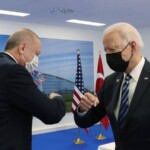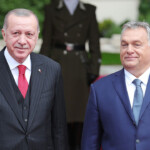For a decade we —a small group of concerned journalists in Turkey— have spoken about the steady decline of independent, free, and pluralist journalism in Turkey. Now, following the latest elections, it is not an exaggeration to speak about its death.
Not a day passes without the harassment —followed by persecution— of a journalist or two in Turkey. The most recent episode was the targeting of the veteran TV host Ayşenur Arslan. Her alleged “crime” was to question the circumstances, motive, and sequence of the latest suicide bombing attack at the Ministry of the Interior in Ankara. In a brief comment, she raised her suspicions, and ended by singing sarcastically.
Immediately after, she was the subject of character assassination by the pro-government media outlets, and the public prosecutor was swift in opening an inquiry, based on an accusation of “terrorist propaganda”. The proprietor of Halk TV, where she made those remarks, rapidly fired her, with a statement rationalizing self-censorship which was ridiculed by a handful of critical journalists as nonsensical. Arslan said she was misunderstood, adding that she was ready to go to prison, “to read books in there in peace and quiet.”
Another day, another victim, in “the free speech slaughterhouse” that is Turkey. Journalism is a redundant profession, in a country that is both a member of NATO and the Council of Europe, and the world watches quietly…
For a decade we —a small group of concerned journalists in Turkey— have spoken about the steady decline of independent, free, and pluralist journalism in Turkey. Now, following the latest elections, it is not an exaggeration to speak about its death.
When Turkey is mentioned in this context, one usually ends by count the jailed journalists. But this clouds the vast reality of what has been happening in the sector, structurally, under constant oppression. The conditions outside prison, in the newsrooms, also constitutes a lost freedom.
Most recently, the Demirören Media Group (which had taken over the main bulk of the media outlets, such as CNNTurk and Kanal D channels and two former flagship papers, Hurriyet and Milliyet) declared that it was shutting down all remnant bureaus in key cities abroad, such Brussels, Berlin, London etc. This is a final blow to the linkage between the public in Turkey and the external world. Other pro-gov’t outlets may be keeping some offices outside, but they operate mainly as propaganda —or even intelligence gathering— units. From now on, the only outlet left to report from the world is Anatolian Agency (AA), which for a decade has been serving under Erdoğan’s palace.
Speaking of news agencies, until 2014-15, there were several competitors to AA, such as IHA, CHA, and DHA, but only the latter (which belongs to the Demirören Group) remains, with a severely downsized and subservient staff. The lack of pluralism in news agencies, which are key in election day coverage of ballotboxes, was very helpful to Erdoğan’s Government in rigging the results.
Pluralism is nearly gone. Apart from the monopolization of the news agencies, we no longer have any major print daily to rely on for accurate news or commentary. Sabah daily, which together with Hurriyet and Milliyet formed a trio of the mainstream news until the end of the 1990’s, have long ago long fallen prey to Erdoğan via loyal business families. This may explain why the overall print circulation collapsed from around 6 million daily to about 2 million. People buy less and less, because they don’t trust the content.
At first glance, Turkish television may give the impression of pluralism and competition. This is wrong. TRT is a state broadcaster, not a public service entity. It is strictly tied to the Palace, and serves the state’s official discourse. It leaves very little space (if any) for the opposition. Its nationalist history and drama series are also often designed and supervised by the secret service units.
Through the massive transformation of ownership structures under the strict regime of Erdoğan, more than 95 % of the media is owned indirectly and controlled by the Palace.
Under these circumstances, up until the May elections, there were minor hopes that the rise of the opposition would lead liberal employees and capital holders to endorse critical independent journalism. Eyes were on TUSIAD (the relatively liberal, globalist body of private business entities) and left-of-center businesspeople. It didn’t happen.
So, the remnant “alternative media” had to operate in an extremely squeezed, threatened manner, to cover key events such as the massive earthquake and election rallies and debates, with bare resources.
On print, we had the daily Yenicag (close to Aksener’s nationalist IYIP), Cumhuriyet, and Sozcu (close to the hawkish side of the main opposition CHP), Karar (close to Ali Babacan’s DEVA Party), and the leftist dailies, Evrensel and Birgun. They all had, and still have, financial restraints. Their cumulative distribution amounted to no more than 250 thousand at best.
On TV, we had three struggling channels: HalkTV (a partisan channel, an extension of the CHP), Tele1 (a hawkish Kemalist channel) and KRT (a left-leaning channel). There is also the pro-Kurdish, leftist Artı-TV, but its broadcasts are not allowed in Turksat; neither it is available on digital platforms. It airs content via Hotbird, which a majority of the Turkish public has no interest in.
A critical threshold was passed months before the elections, as polarization took the media landscape hostage: On one side was an asymmetrically big pro-Erdoğan media, which was confronted by an equally polarized and partisan opposition media. The latter had chosen radicalization before accuracy, fairness, and honesty. The opposition media lost whatever was left of its critical nature, and became a relentless cheerleader for Kılıçdaroğlu and his partners. The casualty of this war of words was decent reporting and critical, pluralistic debate.
I had been a news ombudsman for nearly 15 years, which has given me the tools to take the constant pulse of where Turkish media is, a duty I have continued with Platform for Independent Journalism / P24 as well as the Index on Censorship and other outlets) and as of February/March, my sense of instinct was that given the vacuum in the center, this polarization would spell irreversible trouble.
At this time, my Italian colleague Marco Ansaldo (formerly of La Repubblica) and I presented a worrisome outlook of Turkish media before the elections at a conference in Perugia, Italy.
The election day and day-after coverage was —expectedly— a disaster for the opposition media. Our colleagues were completely certain that Erdoğan would lose, but they had no proper devices to cover the ballot boxes. They had not questioned the traps and technical disadvantages the power would use to its advantage. As a result, theses channels’ broadcasts and the appearances of our colleagues at the end became pathetic.
Then, a week or so later, came the consequences. In the fog of public trauma, it was reported that the CHP had cut a deal with HalkTV to favor the party. HalkTV had refused to be transparent about operating as a partisan channel.
Around the same time, the daily Cumhuriyet became the subject of a scandal. Three of its editors had received cash in return for treating a series of advertorials as “real news.” Its Editor wrote an apology, but this was censored by management—a scandal that a Chief Editor had been blocked. Consequently, he was fired and several others resigned. But other staff and elderly columnists continued as if nothing happened.
Haberturk, it appeared, was told by the Palace that its election coverage “went too far against the powers in Ankara,” so it fired a number of its anchorpersons and columnists.
The immense public discontent in the post-election period has not only been aimed at the political class, but also at the opposition media. Opposition media was sharply one-sided, rejected all critical views of the opposition, and misled and betrayed the public by creating the illusion of an easy opposition win.
To this day, almost all of our colleagues who were responsible came out with a “mea culpa.” They continue as if nothing happened.
On the other hand, the election results empowered Erdoğan and his circle even more against the opposition media.
Online channels remain critical, but the power knows that their impact does not pose a threat. Most of them are unable to pay their staff, so much goes on a voluntary basis. We may soon see that foreign funding becomes criminalized, a la Russia. Sensing that, self-censorship is growing. Deutsche Welle and VOA are still banned by the regime.
Given the overall climate of defeatism in the west, with Turkey turning into Iran or Russia in terms of its political climate, the major western outlets have retreated to freelancing and sporadic reporting. There are only FT, Le Monde, Reuters and Bloomberg operating in Turkey, but under strict surveillance.
CONCLUSION
With offices, units, and service desks shut down, and many experienced editors forced to quit, the overall outlook in the Turkish media is one of profound misery. Pluralist commentary, and editorial independence have ceased to exist. The Turkish public faces a wall between itself and reality. At the same time, decision makers, economic actors, and the general global public lose access to what is really happening Turkey.
This lays a great responsibility to those of us in exile in countries that offer conditions of freedom. There are deeply experienced editors (like myself), and reporters, who have had to leave Turkey with the hope of keeping their profession alive with dignity and ethics.
But sadly, the climate in Europe and North America has also been affected by the election results. Lacking proper opposition dynamics and civilian pro-democracy resistance, Turkey has started to be seen as a lost case. This leads to a reluctance to endorse journalism outside its borders. Some benevolent actors also voice fear that continued backing for decent journalism may infuriate the regime in Ankara. In other words, realpolitik also boosts the slow death of Turkish journalism.
We need a revival of thinking. As brave opposition Russians and Belarussians need Western support, so do we. None of us want to feel that we have been forced to abandon our profession and move on to window cleaning or taxi driving. If we disappear, the regime will cheer up. It will have won in the end.


